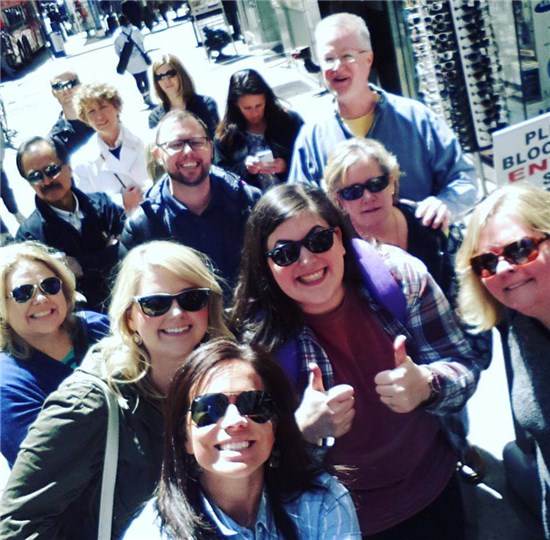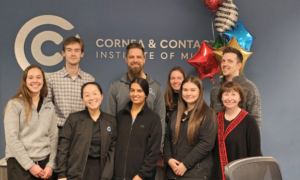By Stuart J. Thomas, OD,
and Ellen Byrum-Goad, LDO
Oct. 19, 2016
At our practice we believe that staff has the ability to serve patients even better than they already do–provided they receive the necessary training. That training sometimes can best be provided with formal continuing education courses. Our practice sponsors, meaning we fund and encourage, staff to enhance their credentials to enable them to more expertly serve our patients.
Provide Basics of Success
We support staff CE because we believe it improves care and increases staffloyalty and practice stability. And staff takes this seriously because we explain these expectations when they are hired, require that staff explain key takeaways from classes and how these learnings areapplicable to practice improvement, and career growth.
Set CE Expectations
We have one OD and 7.5 support staff. Our assistant practice manager is also COA-certified and expected to maintain that certification as he also serves as a technician during the majority of his time in the office.
Our practice is in Georgia, and our state requires you to become a Licensed Dispensing Optician to dispense eyewear. You are highly encouraged to become American Board of Opticianry Certified. After you have completed that certification your next step is to become NCLEC Certified. All education and training classes are paid for by the practice.
Allocate Practice CE Budget
We spend an average of $3,000 annually on continuing education and training, with some years requiring a greater expenditure if we decide to take staff to a conference like Vision Expo East. The practice pays all of it. In the past we took staff to Vision Expo East (twice) and SECO, nearly every year since it is in our backyard, in Atlanta. Going forward the rules will change, and these trips will only be rewarded to those who are serious about advancement.
Tie Educational Opportunities to Conference Attendance
As a bonus for a practice-wide goal we made for the 2015 fiscal year we took our entire staff to Vision Expo East in New York. We did classes and the show, and had about three quarters of one day to tour.
We decided not to do CE classes at VEE this year. We simply enjoyed the show, but the trip was still educational. Each staff member was assigned to research things that we wanted to do differently. The optical gallery staff looked at new frame lines. The techs looked at equipment. And the insurance and billing employees met with insurance providers like VSP/Eyemed.
Along with the educational components, the trip to VEE was a bonding experience. Some employees toured the Empire State Building, some Central Park, and we all did the 9/11 Museum together, and we came back a much stronger team. Through that experience I was able to identify strengths in staff that have allowed us to be more productive–working smarter, not harder this year.
For trips to Vision Expo East with staff, the cost break-down is:
Flights: $2,000
Hotel: $4,200
Meals: $2,000
Total: Less than $10,000 total for the conference, not counting side activities like entry fees to the 9/11 Museum, the Statue of Liberty and other attractions.

The staff of Thomas Eye Center on a trip to New York City for Vision Expo East. Dr. Thomas and Byrum-Goad say this trip was not for continuing education, but for team-building as a reward for reaching a practice-wide revenue generation goal. However, they note that it was educational nonetheless, with opticians researching new frame lines, technicians learning about new equipment and insurance and billing employees meeting in person with the insurance panels they work with.
Help Staff Find CE Opportunities
We are excited for staff to find any and every opportunity for training. For instance, Dr. Thomas was e-mailed notification of a training class that goes over two days, and was expensive, but the education was going to be so hands-on, and taught by such qualified individuals, that we were happy to send the two staff members who wanted to advance in their areas.
Tie CE to Career Trajectory
It is clearly explained that financial advancement only comes with certification.
For instance, we currently have a mature employee who is a great salesperson in our optical.
There is an apprenticeship program in Georgia we offered to her two years ago (we even pay for that). We recently had lunch to determine her interest in furthering her career or remaining where she is. We explained that unless certifications are sought after and obtained there is no further financial reward coming to her. We respect her deeply, and want her to know the parameters required for advancement in the practice, and what her career could look like if she obtains certifications.
The certification path is offered, not forced. If the staff member accepts the training, they understand the expectations. If an employee sits for a certification test and they pass it, we are going to celebrate. If they fail it, they are going to pay the office back out of their next payroll, no exceptions.
For example, one employee chose to hold money back prior to the test (she passed). We do all we can to assist in the passing of certification tests–the first time. If the employee fails, they are on their own financially the second time. They have to pay all of it upfront. However, if they pass the second time, they can bring us their receipts and we are going to reimburse them–and then celebrate.
When one of our staff member achieves a certification, we send an announcement to one of our local newspapers, the Athens Banner Herald, which runs the news in its Business Announcements section. We also post news of the certification on our practice Facebook page, and we send the news out via our e-newsletters to patients. In addition, the staff’s name tag is recreated to show the acronym of the newly earned credential.
Gauge Employee Learning
For each class that a staff member attends they are required to bring back a bullet point list of their top five things learned and how it will help the office, in whatever area it is, efficiency, routing of patients, sales, annual supply sales, or any other area that boosts profitability.
The best one to date has been a staff member who went to a hands-on class. She was only two weeks in the industry, and came back to the office handling drill mounts better than anyone. We loved what she learned… she then taught others.
Identify Most Valuable CE
The continuing education our doctor and staff have received on attaining Meaningful Use (MU) for electronic health records has been of great value. State associations, such as the Georgia Optometric Association, put on an insurance, billing and coding seminar about MU years ago that broke down the expectations for what is needed to attain MU. Right after that we then went to our Electronic Medical Records (Eyefinity EHR and OfficeMate) training in Atlanta, which showed us how to do each parameter of MU. When it came time to attest to Meaningful Use, we sailed right through it. Now with the new parameters heading our way, you won’t be able to hold us back from attending all we can to learn the new processes headed our way.
For optical staff, it is the hands-on classes that allow for the greatest training, and they give the staff practical knowledge and skill that they can put to use the next day. Some of the most valuable have been the personality and elevating-your-culture classes that allow opticians to work together, and with patients better.
Set Aside Time for CE
Set your expectations on time and reporting of CE for your staff. If you want to see their work, require that you be able to know login/passwords for online training, and be ready to help them on the subjects that are more challenging for them.
We have just put into place a two-hour window on Friday afternoons (Dr. Thomas works to 1 p.m. on Friday) during which our staff can grab a laptop and find a quiet corner to do online training with Quantum Optical, an online CE portal for optical professionals, or theOptical Training Institute. You have to pay for the education gained on these sites, but it is priceless in the end with the higher patient experience and satisfaction employees who complete the courses gain.
Beyond that weekly time block, staff have to show initiative to do CE on their own time. We let employees know upfront the time frame within which the CE is expected to be accomplished.
Stuart J. Thomas, OD, is the owner of Thomas Eye Center in Athens, Ga. Contact: StuTh2@vsp.com
Ellen Byrum-Goad, LDO, is practice manager. To contact: Ellen.Goad@thomaseyecenter.com



























